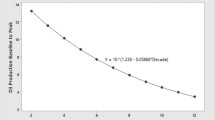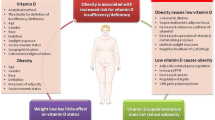Abstract
Summary
Recent studies have suggested that green tea polyphenols (GTP) are promising agents for preventing bone loss in women. Findings that GTP supplementation resulted in increased urinary GTP concentrations and bone mass via an increase of antioxidant capacity and/or a decrease of oxidative stress damage suggest a significant role of GTP in bone health of women.
Introduction
Recent studies suggested that green tea polyphenols (GTP) are promising agents for preventing bone loss in women. However, the mechanism related to the possible protective role of GTP in bone loss is not well understood.
Methods
This study evaluated bioavailability, mechanisms, bone mass, and safety of GTP in preventing bone loss in middle-aged rats without (sham, SH) and with ovariectomy (OVX). A 16-week study of 2 (SH vs. OVX) × 3 (no GTP, 0.1% GTP, and 0.5% GTP in drinking water) factorial design using 14-month-old female rats (n = 10/group) was performed. An additional 10 rats in baseline group were euthanized at the beginning of study to provide baseline parameters.
Results
There was no difference in femur bone mineral density between baseline and the SH+0.5% GTP group. Ovariectomy resulted in lower values for liver glutathione peroxidase activity, serum estradiol, and bone mineral density. GTP supplementation resulted in increased urinary epigallocatechin and epicatechin concentrations, liver glutathione peroxidase activity and femur bone mineral density, decreased urinary 8-hydroxy-2′-deoxyguanosine and urinary calcium levels, but no effect on serum estradiol and blood chemistry levels.
Conclusion
We conclude that a bone-protective role of GTP may contribute to an increase of antioxidant capacity and/or a decrease of oxidative stress damage.




Similar content being viewed by others
References
NIH Consensus Development Panel on Osteoporosis Prevention, Diagnosis, and Therapy (2001) JAMA 285(6):785–795
Nohl H (1993) Involvement of free radicals in ageing: a consequence or cause of senescence. Br Med Bull 49(3):653–667
Basu K, Michaelsson H, Olofsson S et al (2001) Association between oxidative stress and bone mineral density. Biochem Biophys Res Commun 288:275–279
Yang S, Madyastha P, Bingel S et al (2001) A new superoxide-generating oxidase in murine osteoclasts. J Biol Chem 276:5452–5458
Sontakke AN, Tare RS (2002) A duality in the roles of reactive oxygen species with respect to bone metabolism. Clin Chim Acta 318(1–2):145–148
Garrett JR, Boyce BF, Oreffo ROC et al (1990) Oxygen-derived free radicals stimulate osteoclastic bone resorption in rodent bone in vitro and in vivo. J Clin Invest 85:632–639
Dreher I, Schuetze N, Baur A et al (1998) Selenoproteins are expressed in fetal human osteoblast-like cells. Biochem Biophys Res Commun 245:101–107
Fuller K, Lean JM, Bayley KE et al (2000) A role for TGF-β in osteoclast differentiation and survival. J Cell Sci 113:2445–2453
Mody N, Parhami F, Saraflan TA et al (2001) Oxidative stress modulates osteoblastic differentiation of vascular and bone cells. Free Radic Biol Med 31:509–519
Bai X-C, Lu D, Bai J et al (2004) Oxidative stress inhibits osteoblastic differentiation of bone cells by ERK and NF-κB. Biochem Biophys Res Commun 314(1):197–207
Muthusami S, Ramachandran I, Muthsamy B et al (2005) Ovariectoy induces oxidative stress and impairs bone antioxidant system in adult rats. Chinica Chimica Acta 360:81–86
Maggio D, Barabani M, Pierandrei M et al (2003) Marked decrease in plasma antioxidants in aged osteoporotic women: results of a cross-sectional study. J Clin Endocrinol Metab 88:1523–1527
Morton DJ, Barrett-Connor EL, Schneider DL (2001) Vitamin C supplement use and bone mineral density in postmenopausal women. J Bone Miner Res 16:135–140
Siddiqui IA, Afaq F, Adhami VM et al (2004) Antioxidants of the beverage tea in promotion of human health. Antioxid Redox Signal 6(3):571–582
Zaveri NT (2006) Green tea and its polyphenolic catechins: medicinal uses in cancer and noncancer applications. Life Sci 78(18):2073–2080
Hegarty VM, May HM, Khaw KT (2000) Tea drinking and bone mineral density in older women. Am J Clin Nutr 71:1003–1007
Hoover PA, Webber CE, Beaumont LF et al (1996) Postmenopausal bone mineral density: relationship to calcium intake, calcium absorption, residual estrogen, body composition, and physical activity. Can J Physiol Pharmacol 74:911–917
Muraki S, Yamamoto S, Ishibashi H et al (2007) Diet and lifestyle associated with increased bone mineral density: cross-sectional study of Japanese elderly women at an osteoporosis outpatient clinic. J Orthop Sci 12(4):317–320
Kimmel DB (1996) Animal models for in vivo experimentation in osteoporosis research. In: Marcus R, Feldman D, Kelsey J (eds) Osteoporosis. San Diego, CA: Academic Press; pp. 671–683
Bowman BM, Siska CC, Miller SC (2002) Greatly increased cancellous bone formation with rapid improvements in bone structure in the rat maternal skeleton after lactation. J Bone Miner Res 17:1954–1960
Kalu DN, Liu CC, Hardin RR et al (1989) The aged rat model of ovarian hormone deficiency bone loss. J Endocrinol 124:7–16
Takabayashi F, Harada N (1997) Effects of green tea catechins (Polyphenon 100) on cerulein-induced acute pancreatitis in rats. Pancreas 14(3):276–279
Zhu BT, Taneja N, Loder DP et al (1998) Effects of tea polyphenols and flavonoids on liver microsomal glucuronidation of estradiol and estrone. J Steroid Biochem Mol Biol 64(3–4):207–215
Haque AM, Hashimoto M, Katakura M et al (2006) Long-term administration of green tea catechins improves spatial cognition learning ability in rats. J Nutr 136(4):1043–1047
Luo H, Tang L, Tang M et al (2005) Phase IIa chemoprevention trial of green tea polyphenols in high-risk individuals of liver cancer: modulation of urinary excretion of green tea polyphenols and 8-hydroxydeoxyguanosine. Carcinogenesis 112:1–7
Wang JS, Luo H, Wang P, Tang L, Yu J, Huang T, Cox S, Gao W (2007) Validation of green tea polyphenol biomarkers in a phase II human intervention trial. Food Chem Toxiciol August 17; [Epub ahead of print]
Reeves PG, Nielsen FH, Fahey GC Jr (1993) AIN-93 purified diets for laboratory rodents: final report of the American Institute of Nutrition ad hoc writing committee on the reformulation of the AIN-76 rodent diet. J Nutr 123:1939–1951
Shen C-L, Yeh JK, Rasty J et al (2006) Protective effect of dietary long chain n-3 PUFA on bone loss in intact middle-aged male rats. Br J Nutr 95:462–468
Paglia DE, Valentine WN (1967) Studies on the quantitative and qualitative characterization of erythrocyte glutathione peroxidase. J Lab Clin Med 70(1):158–169
Ke HZ, Crawfod DT, Qi H et al (1999) Droloxifene does not blunt bone anabolic effects of prostaglandin E2, but maintains prostaglandin E2-restored bone in aged, ovariectomized rats. Bone 24(1):41–47
Nawrot P, Jordan S, Eastwood J, Rotstein J, Hugenholtz A, feeley M (2003) Effects of caffeine on human health. Food Addit Conta 20(1):1–30
Das AS, Das D, Mukherjee M (2005) Phytoestrogenic effects of black tea extract (Camellia sinensis) in an oophorectomized rat (Rattus norvegicus) model of osteoporosis. Life Sci 77(24):3049–3057
Vali B, Rao LG, El-Sohemy A (2007) Epigallocatechin-3-gallate increases the formation of mineralized bone nodules by human osteoblast-like cells. J Nutr Biochem 18(5):341–347
Nakagawa H, Wachi M, Woo JT et al (2002) Fenton reaction is primarily involved in a mechanism of (-)-epigallocatechin-3-gallate to induce osteoclastic cell death. Biochem Biophys Res Commun 292(1):94–101
Islam S, Islam N, Kermode T et al (2000) Involvement of caspase-3 in epigallocatechin-3-gallate-mediated apoptosis of human chondrosarcoma cells. Biochem Biophys Res Commun 270(3):793–797
Yun JH, Pang EK, Kim CS et al (2004) Inhibitory effects of green tea polyphenol (-)-epigallocatechin gallate on the expression of matrix metalloproteinase-9 and on the formation of osteoclasts. J Periodontal Res 39(5):300–307
Tokuda H, Takai S, Matsushima-Nishiwaki R et al (2007) (-)- epigallocatechin gallate enhances prostaglandin F2alpha-induced VEGF synthesis via upregulating SAPK/JNK activation in osteoblasts. J Cell Biochem 100(5):1146–1153
Tokuda H, Takai S, Hanai Y et al (2007) (-)-Epigallocatechin gallate suppresses endothelin-1-induced interleukin-6 synthesis in osteoblasts: inhibition of p44/p42 MAP kinase activation. FEBS Lett 581(7):1311–1316
Skrzypczak-Jankun E, Zhou K, Jankun J (2003) Inhibition of lipoxygenase by (-)-epigallocatechin gallate: X-ray analysis at 2.1 A reveals degradation of EGCG and shows soybean LOX-3 complex with EGC instead. Int J Mol Med 12(4):415–420
Ha BJ, Lee SH, Kim HJ et al (2006) The role of Salicornia herbacea in ovariectomy-induced oxidative stress. Biol Pharm Bull 29(7):1305–1309
Maggio D, Barabani M, Pierandrei M et al (2003) Marked decrease in plasma antioxidants in aged osteoporotic women: reslts of a cross-sectional study. J Clin Endocrinol Metab 88:1523–1527
Yang S, Madyastha P, Bingel S et al (2001) A new superoxide-generating oxidase in murine osteoclasts. J Biol Chem 276:5452–5458
Sontakke AN, Tare RS (2002) A duality in the roles of reactive oxygen species with respect to bone metabolism. Clin Chim Acta 318(1–2):145–148
Tipoe GL, Leung TM, Hung MW et al (2007) Green tea polyphenols as an anti-oxidant and anti-inflammatory agent for cardiovascular protection. Cardiovasc Hematol Disord Drug Targets 7(2):135–144
Khan SG, Katiyar SK, Agarwal R et al (1992) Enhancement of antioxidant and phase II enzymes by oral feeding of green tea polyphenols in drinking water to SKH-1 hairless mice: possible role in cancer chemoprevention. Cancer Res 52(14):4050–4052
Kimura M, Umegaki K, Kasuya Y et al (2002) The relation between single/double or repeated tea catechin ingestions and plasma antioxidant activity in humans. Eur J Clin Nutr 56(12):1186–1193
Mukherjee M, Das AS, Das D et al (2006) Effects of garlic oil on postmenopausal osteoporosis using ovariectomized rats: comparison with the effects of lovastatin and 17beta-estradiol. Phytother Res 20(1):21–27
Deyhim F, Garica K, Lopez E et al (2006) Citrus juice modulates bone strength in male senescent rat model of osteoporosis. Nutrition 225:559–563
Kuruto-Niwa R, Inoue S, Ogawa S et al (2000) Effects of tea catechins on the ERE-regulated estrogenic activity. J Agric Food Chem 48(12):6355–6361
Shenouda NS, Zhou C, Browning JD et al (2004) Phytoestrogens in common herbs regulate prostate cancer cell growth in vitro. Nutr Cancer 49(2):200–208
Goodin MG, Fertuck KC, Zacharewski TR et al (2002) Estrogen receptor-mediated actions of polyphenolic catechins in vivo and in vitro. Toxicol Sci 69(2):354–361
Kao YH, Hiipakka RA, Liao S (2000) Modulation of endocrine systems and food intake by green tea epigallocatechin gallate. Endocrinology 141:980–987
Wu AH, Arakawa K, Stanczyk FZ et al (2005) Tea and circulating estrogen levels in postmenopausal Chinese women in Singapore. Carcinogenesis 26(5):976–980
Zhang Y, Lai WP, Leung PC et al (2007) Short- to mid-term effects of ovariectomy on bone turnover, bone mass and bone strength in rats. Biol Pharm Bull 30(5):898–903
Liu ML, Xu X, Rang WQ et al (2004) Influence of ovariectomy and 17beta-estradiol treatment on insulin sensitivity, lipid metabolism and post-ischemic cardiac function. Int J Cardiol 97(3):485–493
Liu KJ, Wang WJ, Li DJ et al (2006) Effect of Gengnianchun Recipe on bone mineral density, bone biomechanical parameters and serum lipid level in ovariectomized rats. Chin J Integr Med 12(2):132–136
Tanizawa T, Yamaguchi A, Uchiyama Y et al (2000) Reduction in bone formation and elevated bone resorption in ovariectomized rats with special reference to acute inflammation. Bone 26(1):43–53
Liu KJ, Wang WJ, Li DJ et al (2006) Effect of Gengnianchun Recipe on bone mineral density, bone biomechanical parameters and serum lipid level in ovariectomized rats. Chin J Integr Med 12(2):132–136
Giakoustidis AE, Giakoustidis DE, Iliadis S et al (2006) Attenuation of intestinal ischemia/reperfusion induced liver and lung injury by intraperitoneal administration of (-)-epigallocatechin-3-gallate. Free Radic Res 40(1):103–110
Acknowledgements
This study was supported by Lubbock Endowed Professorships, Lubbock, TX, USA (CLS) and the NIH/NCI grant CA90997 (JSW).
Conflicts of interest
None.
Author information
Authors and Affiliations
Corresponding author
Additional information
Supported by Lubbock Endowed Professorship to CLS and NIH grant CA90997 to JSW.
Rights and permissions
About this article
Cite this article
Shen, CL., Wang, P., Guerrieri, J. et al. Protective effect of green tea polyphenols on bone loss in middle-aged female rats. Osteoporos Int 19, 979–990 (2008). https://doi.org/10.1007/s00198-007-0527-5
Received:
Accepted:
Published:
Issue Date:
DOI: https://doi.org/10.1007/s00198-007-0527-5




